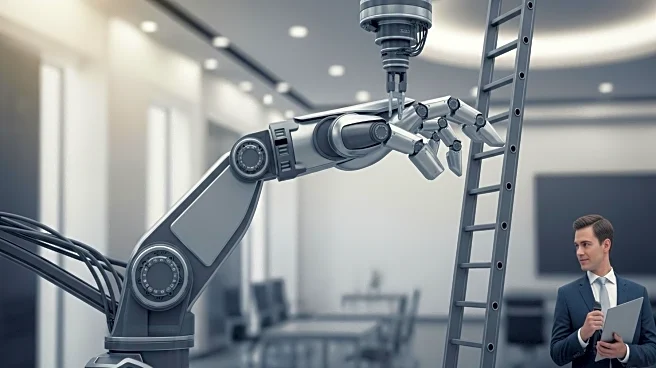What's Happening?
The rise of artificial intelligence (AI) is significantly altering the traditional career ladder in corporate America, particularly affecting entry-level positions. Historically, many CEOs, such as Antonio Neri of Hewlett Packard Enterprise and Doug McMillon of Walmart, began their careers in entry-level roles, climbing the corporate ladder over time. However, AI is poised to replace a substantial portion of these entry-level jobs, with predictions suggesting up to 50% may be eliminated. This shift is causing organizations to flatten their structures, reducing middle management roles and altering the path to upward mobility within companies. The decline in entry-level positions is evident in data from venture capital firm SignalFire, which shows a 50% drop in new role starts for individuals with less than one year of post-graduate experience across various business functions.
Why It's Important?
The transformation driven by AI has profound implications for the workforce and corporate culture in the U.S. The traditional narrative of rising from entry-level positions to executive roles is becoming less feasible, potentially impacting the transfer of institutional knowledge and the development of future leaders. As entry-level jobs diminish, new graduates face increased pressure to acquire advanced skills independently, reshaping how talent is cultivated within organizations. This shift may lead to a more tech-savvy workforce but also poses challenges for recent graduates entering the job market during a period of uncertainty. The broader impact includes potential changes in employment rates and economic structures, as businesses and educational institutions adapt to the evolving landscape.
What's Next?
Organizations and educational institutions are responding by focusing on AI training and skill development to prepare the workforce for the changing job market. Universities are partnering with AI companies to integrate AI training into their curricula, aiming to equip students with the necessary skills to thrive in a tech-driven environment. Businesses are encouraged to offer training programs to support effective use of AI tools, addressing gaps in adoption and ensuring equitable access to opportunities. The long-term effects of AI on employment and corporate structures remain speculative, with experts suggesting that significant changes may take decades to materialize.
Beyond the Headlines
The ethical and societal implications of AI's impact on the workforce are significant. Concerns about wealth and power concentration, as well as the potential for AI to surpass human capabilities in all job functions, raise questions about the future of work and economic equality. Ensuring that the benefits of AI are broadly shared across the workforce is a critical challenge for businesses and policymakers. The potential for AI to create superintelligence further complicates the landscape, with experts warning of the risks associated with unregulated AI development.










